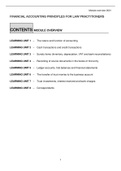Summary
Summary FAC1503 EXPLAINED STUDY GUIDE SEMESTER 2 2022
- Institution
- University Of South Africa (Unisa)
FAC1503 FULLY EXPLAINED SEMESTER 2 2022 SEMESTER % TRUSTED workings, explanations & solutions. 060 966 3364 for assistance. ALL UNITS FULLY EXPLAINED AND ELABORATED
[Show more]



